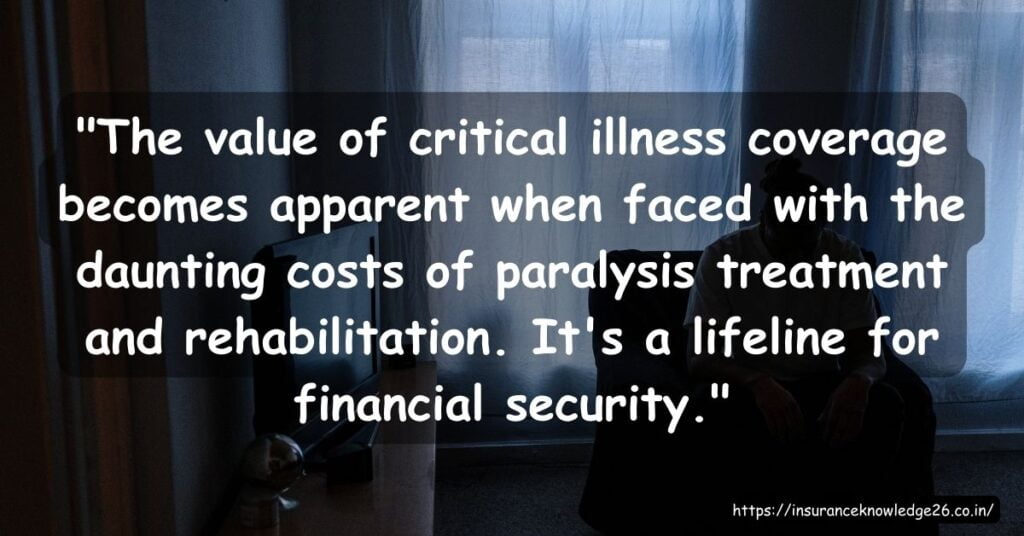Critical illness cover, often referred to as critical illness insurance or simply CI insurance, is a financial product designed to provide a lump sum payment to policyholders upon diagnosis of a severe medical condition. While it’s commonly associated with conditions like cancer, heart disease, and stroke, there’s a growing recognition of the need for critical illness cover for paralysis. Paralysis is a life-altering condition that can result from various causes, including accidents, spinal cord injuries, and certain medical conditions. In this article, we will explore the importance of critical illness cover for paralysis, its coverage considerations, and why individuals should consider adding it to their insurance portfolio.

Understanding Paralysis
The lack of muscular tone in a portion of your body is known as paralysis. It can be partial or complete, affecting one or more limbs, or even the entire body. Paralysis can result from a wide range of factors, including:
Traumatic Injuries: Accidents, falls, and sports injuries can lead to spinal cord injuries that cause paralysis.
Medical Conditions: Certain medical conditions like multiple sclerosis, ALS (Amyotrophic Lateral Sclerosis), and Guillain-Barré syndrome can lead to paralysis.
Stroke: Strokes can cause sudden paralysis, often affecting one side of the body.
Spinal Cord Diseases: Conditions like transverse myelitis and spinal cord tumors can lead to paralysis.
Infections: Rare infections like polio can cause paralysis.
The physical and emotional impact of paralysis can be devastating. It often necessitates extensive medical care, rehabilitation, and lifestyle adjustments. Additionally, paralysis can result in the loss of income due to the inability to work, and it may require significant modifications to living arrangements, such as home renovations to accommodate mobility aids and accessible vehicles.
The Role of Critical Illness Cover
Critical illness cover is designed to provide financial assistance when policyholders are diagnosed with a covered critical illness, including paralysis. When an individual is diagnosed with paralysis, a critical illness policy pays out a lump sum benefit to help cover medical expenses, rehabilitation costs, and any other financial burdens that may arise.

Coverage Considerations for Paralysis
Policy Definitions: Before purchasing critical illness cover, it’s essential to carefully review the policy definitions. Ensure that paralysis is explicitly listed as a covered condition, and understand the criteria that must be met for a claim to be valid. Different policies may have varying definitions of paralysis, so read the fine print.
Waiting Period: Most critical illness policies have a waiting period before coverage becomes effective. This waiting period can range from 30 days to several months after the policy’s inception. It’s crucial to be aware of this waiting period and plan accordingly.
Coverage Amount: Determine the appropriate coverage amount based on your individual needs. Consider medical expenses, rehabilitation costs, home modifications, and potential income loss when deciding on the coverage amount. Making an informed decision can be facilitated by seeking financial advice.
Premiums: Critical illness insurance premiums can vary significantly based on factors such as age, health, and coverage amount. Compare premiums from different insurers to find the most competitive rates. Keep in mind that while lower premiums are attractive, it’s crucial to assess the policy’s overall coverage and benefits.
Exclusions: Pay close attention to the policy’s exclusions. There may be exclusions from coverage for particular activities or medical conditions. Understanding these exclusions will prevent any surprises when you need to make a claim.
Waiting Period for Pre-Existing Conditions: Some policies may have a waiting period specifically for pre-existing conditions. If you have a medical history that includes paralysis-related risks, inquire about how the policy handles pre-existing conditions.
Renewability and Convertibility: Check if the policy offers guaranteed renewability and convertibility options. Guaranteed renewability ensures that the insurer cannot cancel your policy as long as you continue paying premiums. Convertibility allows you to convert your critical illness policy into a permanent life insurance policy without providing evidence of insurability.

Why Consider Critical Illness Cover for Paralysis?
Financial Security: The financial implications of paralysis can be overwhelming. Critical illness cover provides a financial safety net, ensuring that you have the funds necessary to cover medical bills, rehabilitation, and ongoing care.
Quality of Life: Paralysis often requires significant lifestyle adjustments, including mobility aids, home modifications, and in-home care. Critical illness insurance can ease the financial burden of these changes, allowing you to maintain a higher quality of life.
Income Replacement: If paralysis prevents you from working, critical illness cover can help replace lost income. This ensures that you can continue to meet your financial obligations, such as mortgage payments and daily living expenses.
Peace of Mind: Knowing that you have critical illness coverage for paralysis can provide peace of mind to you and your family. You can focus on your recovery and well-being without worrying about the financial aspect of your condition.
Support for Loved Ones: The emotional toll of paralysis extends to your loved ones as well. A critical illness policy can ease their worries by providing financial support for your care and rehabilitation.
Critical illness cover for paralysis is a valuable addition to your insurance portfolio. Paralysis can strike suddenly and lead to significant medical expenses, lifestyle adjustments, and financial challenges. By carefully considering coverage options, policy definitions, waiting periods, and other important factors, you can ensure that you are adequately protected in the event of a paralysis diagnosis. Ultimately, critical illness insurance provides not only financial security but also peace of mind, allowing you to focus on your recovery and well-being. Don’t wait until it’s too late; explore your critical illness insurance options today to safeguard your future.
Disclaimer
The information provided in this post is based on general knowledge and may not be up-to-date or applicable to specific insurance products or regulations in your jurisdiction. Insurance policies and regulations can vary widely, so it’s essential to research and verify information with local authorities or insurance providers.
FAQs
Is paralysis a critical illness?
A serious sickness called paralysis leaves the patient unable to move some of his or her body parts. Head injury, spinal trauma, multiple sclerosis, spinal deformity, transverse myelitis, spinal cord tumor, substance misuse, cerebral palsy, etc. are some common causes of paralysis.
Is paralysis covered under health insurance?
Partial, total, temporary, or permanent paralysis are all possible. However, occasionally physical therapy can work wonders and help the body retain and restore its natural strength. Since paralysis falls under the category of a critical illness, it is not covered by your standard health insurance plan.
Is paralysis an accident?
Loss of motion is most frequently brought about by strokes, generally from a hindered supply route in your neck or mind. It additionally can be brought about by harm to your mind or spinal line, similar to what can occur in a fender bender or sports injury.
Is paralysis long term?
Here and there loss of motion can be impermanent, such as having rest loss of motion, or long haul, as solid dystrophy. It can likewise be brought about by a mind growth or particular sorts of disease like head or neck malignant growth.
What qualifies as critical illness?
Basic Disease Protection gives benefits when a covered individual is determined to have a qualified condition like coronary episode, stroke, significant organ relocate, end stage renal disappointment or coronary supply route sidestep a medical procedure.

